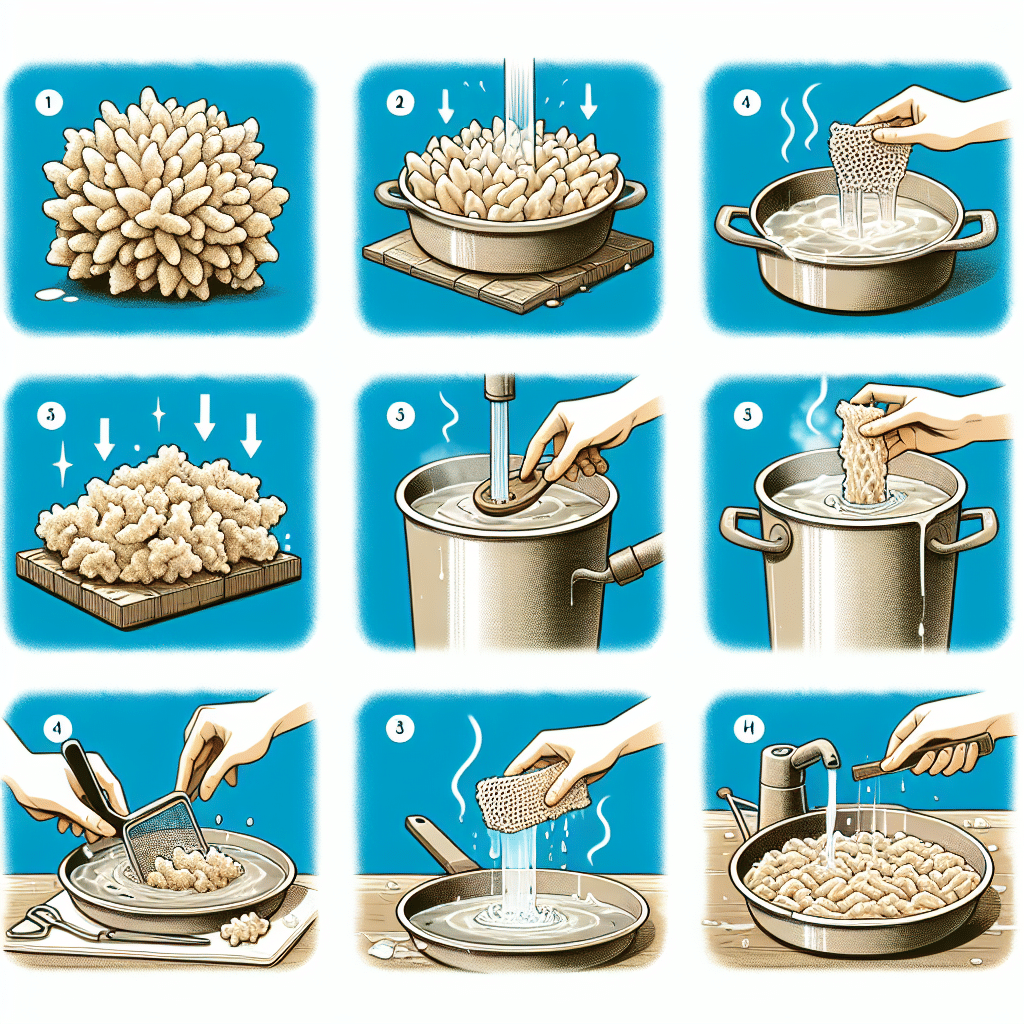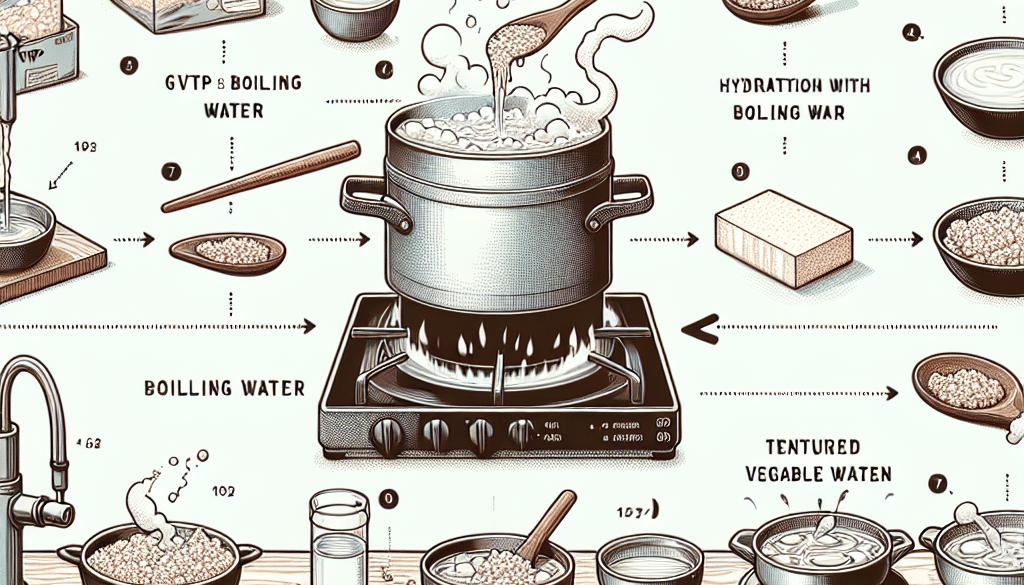Does TVP Need To Be Cooked?
-
Table of Contents
Understanding TVP: Does It Require Cooking Before Consumption?

Textured Vegetable Protein (TVP) is a highly versatile ingredient that has become a staple in vegetarian and vegan diets. As a plant-based source of protein, TVP is not only nutritious but also environmentally friendly and cost-effective. However, one common question that arises among consumers is whether TVP needs to be cooked before it can be safely consumed. This article delves into the nature of TVP, its preparation methods, and the importance of cooking it properly.
What is Textured Vegetable Protein?
Textured Vegetable Protein, commonly known as TVP, is a dehydrated soy product designed to mimic the texture of meat. It is made from defatted soy flour, a by-product of extracting soybean oil. TVP is rich in protein and contains no fat, making it an excellent meat substitute for those looking to reduce their meat consumption or for those following a plant-based diet.
Is Cooking TVP Necessary?
The short answer is yes, TVP should be cooked before consumption. Although TVP is often sold in a dehydrated form that may seem ready-to-eat, cooking it is essential for several reasons:
- Hydration: TVP needs to be rehydrated to become palatable. Cooking it in water or broth allows it to absorb liquid and expand, resulting in a texture similar to ground meat.
- Flavor: Cooking TVP with seasonings and sauces enhances its flavor, making it a more enjoyable and versatile ingredient in various dishes.
- Safety: While TVP is pre-cooked to some extent during the manufacturing process, ensuring it is thoroughly cooked can eliminate any potential bacteria or contaminants that may have been introduced during packaging or handling.
How to Cook TVP
Cooking TVP is a straightforward process that involves rehydration and flavoring. Here’s a basic method to prepare TVP:
- Measure the desired amount of TVP.
- Boil water or broth, using a 1:1 ratio of liquid to TVP.
- Pour the boiling liquid over the TVP and let it sit for about 10 minutes until it’s fully rehydrated.
- Once rehydrated, the TVP can be used as is or further cooked with other ingredients to create a variety of dishes.
It’s important to note that the cooking time and methods may vary depending on the recipe and the desired outcome. Some recipes may call for frying, baking, or simmering TVP with other ingredients.
Recipes and Uses for Cooked TVP
TVP is incredibly versatile and can be used in a multitude of recipes. Here are some popular ways to incorporate cooked TVP into meals:
- Tacos or burritos: Use seasoned TVP as a filling in place of ground beef.
- Chili: Add rehydrated TVP to your favorite chili recipe for added protein.
- Meatloaf or burgers: Mix TVP with other ingredients to form patties or loaves.
- Pasta sauce: Stir TVP into marinara or Bolognese sauce for a meaty texture.
Health Benefits of TVP
Beyond its culinary flexibility, TVP offers several health benefits:
- High in protein: TVP is an excellent source of complete protein, containing all essential amino acids.
- Low in fat: Since it’s made from defatted soy flour, TVP is low in fat and calories, making it a heart-healthy choice.
- Rich in fiber: The fiber content in TVP can aid digestion and promote satiety.
- Contains essential nutrients: TVP is a good source of iron, magnesium, and phosphorus.
Conclusion: The Importance of Cooking TVP
In conclusion, TVP is a nutritious and adaptable ingredient that should be cooked before consumption. Cooking not only ensures safety and palatability but also allows for the absorption of flavors, making TVP a delicious addition to a wide range of dishes. Whether you’re a seasoned vegan or just looking to incorporate more plant-based proteins into your diet, TVP is an excellent choice that can be easily prepared and enjoyed in countless recipes.
Discover ETprotein’s High-Quality Protein Products
If you’re interested in exploring plant-based protein options, ETprotein offers a range of high-quality protein products that cater to various dietary needs and preferences. Their selection includes organic rice protein, pea protein, and a variety of seed-based proteins, all characterized by a neutral taste and non-GMO, allergen-free attributes. ETprotein’s products are ideal for those seeking to enhance their protein intake with plant-based sources.
About ETprotein:
ETprotein, a reputable protein and L-(+)-Ergothioneine (EGT) Chinese factory manufacturer and supplier, is renowned for producing, stocking, exporting, and delivering the highest quality organic bulk vegan proteins and L-(+)-Ergothioneine. They include Organic rice protein, clear rice protein, pea protein, clear pea protein, watermelon seed protein, pumpkin seed protein, sunflower seed protein, mung bean protein, peanut protein, and L-(+)-Ergothioneine EGT Pharmaceutical grade, L-(+)-Ergothioneine EGT food grade, L-(+)-Ergothioneine EGT cosmetic grade, L-(+)-Ergothioneine EGT reference grade and L-(+)-Ergothioneine EGT standard. Their offerings, characterized by a neutral taste, non-GMO, allergen-free attributes, with L-(+)-Ergothioneine purity over 98%, 99%, cater to a diverse range of industries. They serve nutraceutical, pharmaceutical, cosmeceutical, veterinary, as well as food and beverage finished product distributors, traders, and manufacturers across Europe, USA, Canada, Australia, Thailand, Japan, Korea, Brazil, and Chile, among others.
ETprotein specialization includes exporting and delivering tailor-made protein powder and finished nutritional supplements. Their extensive product range covers sectors like Food and Beverage, Sports Nutrition, Weight Management, Dietary Supplements, Health and Wellness Products, and Infant Formula, ensuring comprehensive solutions to meet all your protein needs.
As a trusted company by leading global food and beverage brands and Fortune 500 companies, ETprotein reinforces China’s reputation in the global arena. For more information or to sample their products, please contact them and email sales(at)ETprotein.com today.












